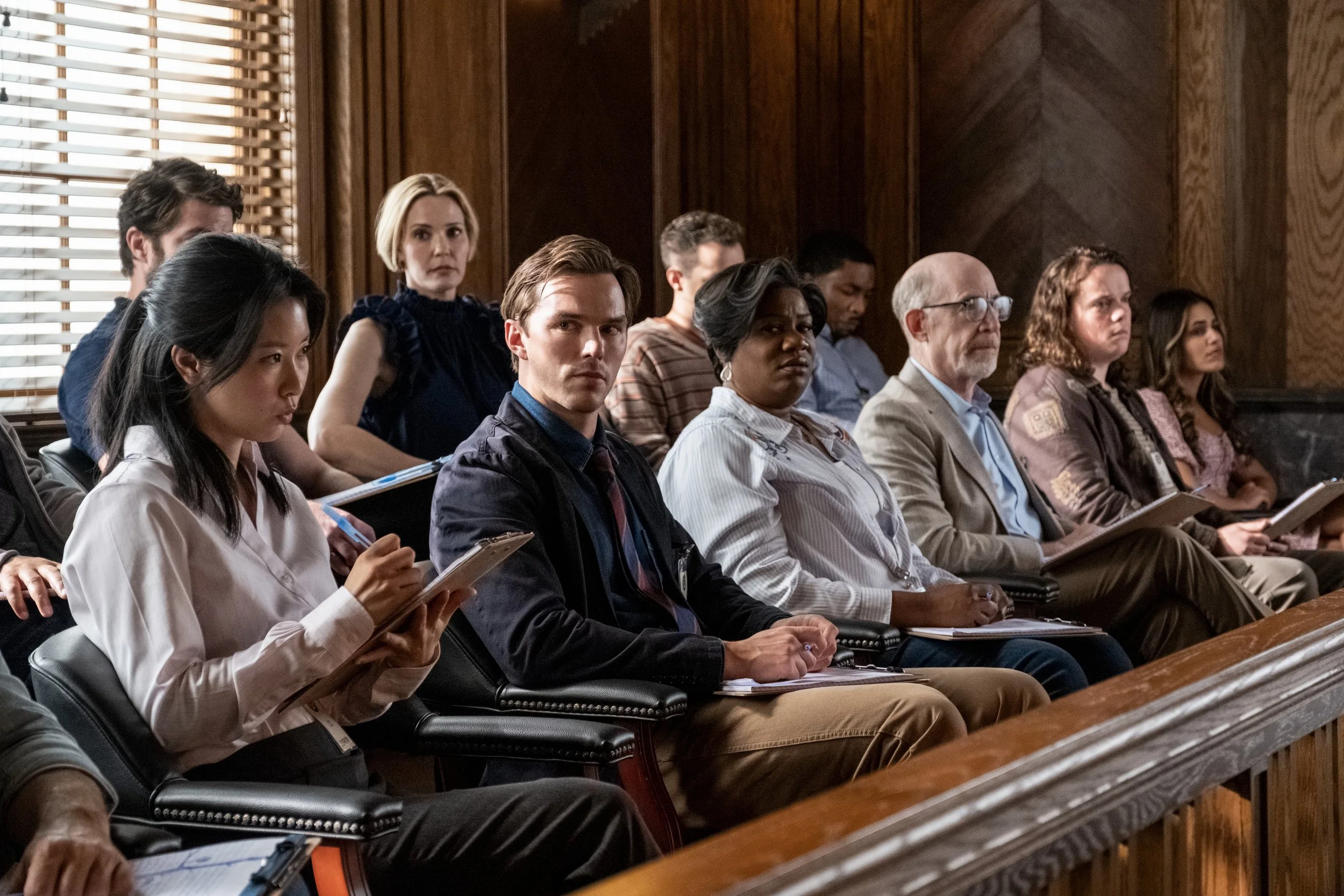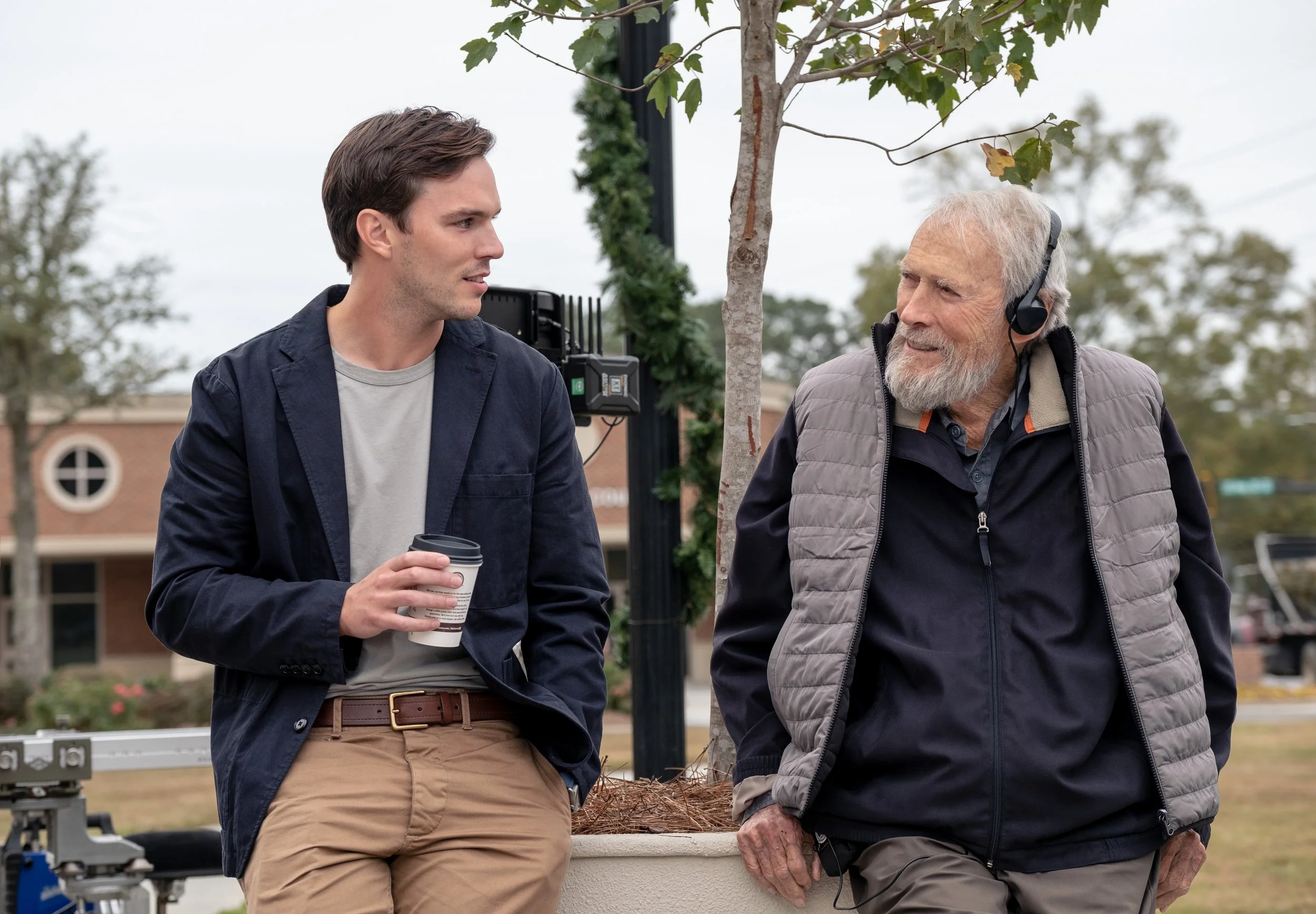Juror #2 | 2024
Nicholas Hoult in Clint Eastwood’s JUROR #2. Courtesy of Warner Bros. Pictures.
It's hard to talk about Clint Eastwood's Juror #2 without talking about the shameful way it's been treated by Warner Bros., who gave the film an incredibly limited run with no plans for expansion, despite Eastwood being a consistent moneymaker for the studio with his midbudget, adult oriented dramas such as The Mule and Sully, and American Sniper. Eastwood, now 94 years old, is an American legend, and while he isn't the only aging filmmaker who's struggled to find financing for their late period projects, it is somewhat shocking to see such a reliable, no-nonsense filmmaker get pushed aside in this manner.
Juror #2 is a no ambitiously grand epic like Francis Ford Coppola's Megalopolis (which received a wide theatrical release) or an expensive passion project like Martin Scorsese's Killers of the Flower Moon (which also made it into a wide release). It's a solid, straight-shooting mid-budget legal thriller the likes of which used to populate multiplexes on a regular basis in the 1990s and early 2000s - think The Firm, A Time to Kill, or A Few Good Men. Was it destined to be a huge hit? Probably not. But with a modest budget of $35 million (compared to $120 million for Megalopolis and $200 million for Killers of the Flower Moon), it was an almost guaranteed moneymaker on Eastwood's name alone.
But enough about box office and budgets and what an absolute nightmare of a human WB CEO David Zaslav is, because Juror #2 is worth so much more than that. It is, perhaps, Eastwood's strongest film in years, which is saying quite a lot considering that I am a strong champion of much of his late period work like Cry Macho, The Mule, and Richard Jewell. While I think Cry Macho would have made a lovely career swan song, the kind of career self-reflection that Eastwood does so well (see also Unforgiven and Gran Torino), there's a disarming energy to Juror #2 that shows that the venerable filmmaker still has something urgent to say.
The film stars Nicholas Hoult as Justin Kemp, a young father-to-be who finds himself called for jury duty for a murder trial set to take place around the third trimester of his wife's high risk pregnancy. Hoping to use his wife's pregnancy to be excused from the trial, he is instead picked for the jury and finds himself in the middle of a murder trial in which a man is accused of murdering his girlfriend and tossing her body off a bridge after a drunken fight at a bar. It soon becomes clear, however, that the event took place on the very same night that Justin left that very same bar and struck what he thought was a deer on the bridge under which her body was found, and with growing horror he comes to understand that what he struck on that bridge may not have been a deer after all, and that the man on trial is innocent and it is he who is guilty. Justin is now faced with a terrible dilemma - to try to convince his fellow jury members of the man's innocence without revealing his guilt, or ruin an innocent man's life in order to protect himself and his fledgling family.
Nicholas Hoult and Clint Eastwood on the set of JUROR #2. Courtesy of Warner Bros. Pictures.
Even as someone who is typically in the tank for Eastwood, I found myself riveted by what he was doing in Juror #2. This is an honest-to-god they-don't-make-em-like-this-anymore meat and potatoes courtroom drama. Eastwood is tackling some thorny moral questions here, not just about his protagonist's quandary, but about the justice system itself. Toni Collette's crusading prosecutor feels like a flipside of Olivia Wilde's controversial muckraking journalist in Richard Jewell, at first seeming like an ambitious politician pushing a flimsy case through in order to bolster her poll numbers, who ultimately becomes the film's moral compass as she begins to realize that the very case she's arguing is based on faulty evidence and lazy investigation.
Eastwood directs with what has become his signature no-frills style, but the economy of his work is often deceptively simple. The way he blocks a scene is often so incisive - this is a man who has spent his life in the movies and knows instinctively how to tell a compelling story. In Juror #2, he handles conflicting emotions in ways that are consistently riveting, placing his protagonist and the audience in a sea of moral grey that tests the very limits not just of the American justice system, but of the idea of justice itself.
Eastwood occasionally gets flack for his conservative politics, but I don't think there's a more vital American filmmaker of the last 30 or so years. I think his conservatism actually makes his interrogation of American myth-making more interesting. Like John Ford before him, his films aren't blind jingoism about American greatness. There's a sadness at the discovery of its failures. They're introspective rather than didactic - confronting our past and grappling with how it clashes with our narratives. Juror #2 grapples with the idea of justice in a system where justice isn't necessarily the same thing as truth, and in some ways is simply designed to make us feel better about ourselves without actually addressing problems. Who, then, is it serving? In a world where justice no longer seems blind, Eastwood's clear-eyed requiem feels like an essential portrait of the search for truth in a post-truth world. This is a major work from one of the great American filmmakers.

